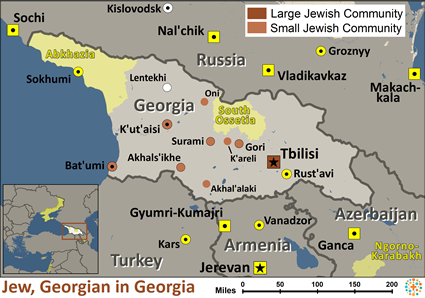The Georgian-speaking Jewish people comprise one of oldest surviving Diaspora among the Jewish people. The first Jews in Western Georgia arrived in the 6th century when the region was ruled by the Byzantine Empire. Approximately 3,000 of these Jews then fled to Eastern Georgia, controlled by the Persians. In the second half of the 7th century; the Muslim Empire conquered extensive Georgian territory and remained in power until 1122. During this rule the Jewish people deviated from their customs and traditions. The Mongols swept through Georgia in 1236, prompting many of the Jews of Eastern and Southern Georgia to move to the western region, which remained independent. There they formed small, poverty-stricken communities along the Black Sea, and eventually their destitution forced them into serfdom. For 500 years, beginning at the end of the 14th century, the Jews of Georgia belonged to the serf (slave) class, under the Georgian elite. By the end of the 15th century Jewish serfs were sold from master to master as a family or individuals as debt payments or gifts. The Jewish communities were torn apart and Jewish communal life was nearly impossible to maintain. Isolation and lack of a religious and spiritual center led to a decline of Jewish knowledge.
In the 17th and 18th centuries, tens of thousands of Jewish and non-Jewish Georgians were forcibly relocated to Persia by the Persian invaders. An endless string of wars and rebellions characterized the late 18th and early 19th centuries. In 1801, the Russian Empire annexed Eastern Georgia and between 1964-71 Russian authorities abolished serfdom. The Jews of Georgia were now free and they moved back their towns and established their own synagogues with a rabbi who oversaw religious and communal affairs. In the beginning of the 19th century, Ashkenazi Russian Jews were forced to move to Georgia by the Russian government. The Ashkenazi Jews and the Georgian Jews began establishing contact with each other, but relations were strained. Georgian Jews viewed the Ashkenazim as godless and secular, while the Ashkenazim looked down on the Georgian Jews. Zionism was the only uniting cause for the two groups, and Ashkenazim joined Zionist organizations and began to spread their ideas to the Georgian Jewish communities. In 1897, the first Zionist organization was established in Tbilisi, Georgia. In 1918, the All-Jewish Congress in Tbilisi took place and included representatives from every Georgian and Russian Jewish community in the country.
Anti-Semitism was a serious problem in Georgia, especially in the second half of the 19th century. Between 1863-1916 about 440 Georgian Jews began to immigrate to Israel. After the October 1917 Russian Revolution threw out the Tsar's government and replaced it with the Bolsheviks, and by 1918 Georgia became independent, and life greatly improved for the Jews of Georgia. During World War I, thousands of Georgian Jews served in the Soviet Army. After the war, the authorities arrested Jews and closed or destroyed synagogues, and anti-Semitic acts of violence erupted. But despite their attempts, the Soviets could not completely annihilate the practice of Judaism and, most Georgian Jews managed to observe their traditions. During the 1970s, about 30,000 Georgian Jews immigrated to Israel and thousands of others left for other countries. Tbilisi has the largest Jewish population in Georgia today. After the fall of the Soviet Union, Georgia declared her independence in 1991, and became a Commonwealth of Independent States (CIS) republic. Since independence, the country has faced continuous military conflict, leaving the region in political and economic turmoil. Jews of Georgia have successfully maintained their Jewish identity and traditions. Intermarriage has always been low.
A few of the Georgian Jewish people have received a higher education and work in the areas of medicine, banking, arts and business. Many are active in government and public life. Some are employed as laborers, and a few maintain small farms. A small number have advanced in sports such as soccer. Unfortunately, the economy of Georgia has suffered, salaries are extremely low, and the people struggle to pay for basic needs such as food, shelter, health services, and fuel. Family members are very close and loyal to each other. High moral standards are typical of Georgian Jewish families.
They have maintained their Jewish traditions much more so than most of the other Jews of the former Soviet Union. Their knowledge of Jewish religion is also considerably higher than that of the Jews in the other former Soviet republics. They have an active Jewish community. A few of the younger generation have only one Jewish parent and don't identify as Jewish or participate in Jewish activities.
In the past, Jews and native Georgians lived together in harmony, and the Jews never faced the persecutions and massacres that decimated Jews in other lands. In addition, Georgia has become embroiled in civil war as the regions of Abkhazia and South Ossetia have been trying to win independence from Georgia. Today, the Georgian Jews are facing a rising tide of anti-Semitism.
Pray that Messianic Jewish believers in Eastern Europe and Georgian Christians will be committed to developing friendships with the Georgian Jews so they can help them begin a movement to Christ. Pray that they understand that becoming a follower of Jesus does not mean that they lose their Jewish identity; instead it enables them to enter into the joy of knowing God's full plan of salvation for every tribe, tongue and nation.
Ask God to anoint the gospel message as it goes forth by radio in their area.
Ask God to raise up prayer teams who will faithfully be in prayer for the Georgian Jewish people.
Scripture Prayers for the Jewish, Georgian in Georgia.
| Profile Source: Joshua Project |

























